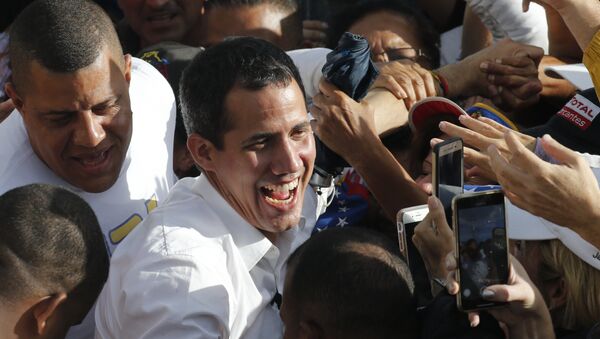On July 17, the Los Angeles Times newspaper reported, citing government internal memos, that $41.9 million would be used to cover expenses for airfare, salaries, "good governance" training, information campaigns and other "democracy-building" projects of Guaido and his team.
The memo, dated July 11, said the decision to divert the money to the Venezuelan opposition was made in response to an "exigent" crisis affecting US "national interest."
US Role in Migration Problems of Central America
Both Guatemala and Honduras have been at the centre of the migration crisis in Central America, with thousands of people fleeing poverty, crime and corruption in their home countries and seeking asylum in the United States.
According to Michael Derham, a professor of Spanish and Latin American Studies at Northumbria University, most of the problems that Central American countries are now facing stem from US actions in the past.
"The US has interfered in the politics of the region for decades and has been responsible for the removal from power of progressive presidents and the installation of, and continuing support for, many corrupt tyrants," Derham said.
He took the situation in Nicaragua as an example, saying that the country was suffering from the US-backed violent opposition and fake news.
"So, the migration problem in Central America has been caused by the United States," Derham stressed.
Another serious problem that has been one of the major sources of insecurity in Central America is gang violence and it, too, started with Central American migrants being imprisoned in the United States, according to the expert.
"Once repatriated, the gang phenomena followed them back 'home' to Central America," Derham noted, adding that the decision to divert the money to Venezuela would negatively affect the region's economy and law enforcement, thereby causing more urge to emigrate.
Withdrawal of Central American Aid to Further Damage Venezuela's Economy
Neither will these $41.9 million help improve the situation in Venezuela, Derham said.
"The US has caused the problems in Venezuela, the $40 million will just make them worse so the US should pay to provide that humanitarian assistance. Of course, the US will not want to do that. I get the sense that the Trump government wants to shut down its humanitarian assistance program unless it works to the benefit of the US," he stressed.
According to Derham, giving the money to what he said was Guaido's illegitimate opposition will cause further damage to Venezuela's society and economy.
"There has already been migration out of Venezuela in large numbers due to the broken economy and opposition-sponsored violence. That will continue as the opposition will never win an election as individual parties," the expert underlined.
He argued that the US policy toward Central America had never been aimed at actually helping people in those countries.
"It was always aimed at installing the government or president which the US preferred. The US also has always wanted access for its businesses and products to the region which the aid foments under the guise of 'modernization'. It also wants to sell arms and military training to these government," Derham pointed out.
Moreover, the aid money does not usually reach the people despite the fact that the situation in most Central American countries is "absolutely" desperate for the majority of them, the professor added.
"The Catholic Church has traditionally tried to help the poor but the higher echelons of the Church have always had strong ties to government and have worked in cahoots with it," Derham stressed.
Lack of Meaningful Impact of US Aid on Central American Countries
According to Georg Wink, a professor of Latin American Studies at the University of Copenhagen, the US decision to redirect the money to the Venezuelan opposition will have no significant impact on the current migration flows from these countries.
"Because $40 million is just peanuts without any impact on the economies of these countries," Wink said.
At the same time, the Venezuelan opposition may receive a much bigger sum than that via indirect or partially illegal channels, he added.
But when it comes to the development of Central American countries in general, the aid has no meaningful impact, Wink argued.
"Besides the amounts being ridiculous, most of the money is spent on US development aid staff (salaries, travel expenses, etc.) and conditioned by buying equipment in the US. Actually, development aid is much more a way to subsidize the own economy than to transfer money to the 'benefiting' countries," he said.
This is a general issue of humanitarian assistance pertaining to all Western donors, not only the United States.
Venezuela has been suffering from an acute political crisis since January when US-backed opposition leader and head of National Assembly Guaido proclaimed himself interim president in a bid to oust incumbent leader Nicolas Maduro.
The United States and its allies, including a number of EU nations, have swiftly recognized Guaido, while Russia, China, Cuba, Bolivia, Turkey among others voiced their support for Maduro as the country’s only legitimate president. Maduro, in turn, has called Guaido a US puppet and accused Washington of orchestrating a coup to push through a change of government and take over Venezuelan natural resources.
The views expressed in this article are those of the speaker and do not necessarily reflect those of Sputnik.

